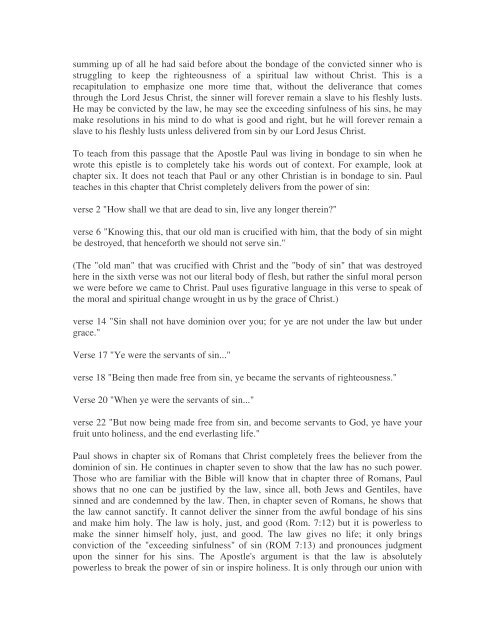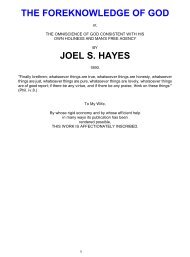Are Men Born Sinners? - Library of Theology
Are Men Born Sinners? - Library of Theology
Are Men Born Sinners? - Library of Theology
Create successful ePaper yourself
Turn your PDF publications into a flip-book with our unique Google optimized e-Paper software.
summing up <strong>of</strong> all he had said before about the bondage <strong>of</strong> the convicted sinner who is<br />
struggling to keep the righteousness <strong>of</strong> a spiritual law without Christ. This is a<br />
recapitulation to emphasize one more time that, without the deliverance that comes<br />
through the Lord Jesus Christ, the sinner will forever remain a slave to his fleshly lusts.<br />
He may be convicted by the law, he may see the exceeding sinfulness <strong>of</strong> his sins, he may<br />
make resolutions in his mind to do what is good and right, but he will forever remain a<br />
slave to his fleshly lusts unless delivered from sin by our Lord Jesus Christ.<br />
To teach from this passage that the Apostle Paul was living in bondage to sin when he<br />
wrote this epistle is to completely take his words out <strong>of</strong> context. For example, look at<br />
chapter six. It does not teach that Paul or any other Christian is in bondage to sin. Paul<br />
teaches in this chapter that Christ completely delivers from the power <strong>of</strong> sin:<br />
verse 2 "How shall we that are dead to sin, live any longer therein?"<br />
verse 6 "Knowing this, that our old man is crucified with him, that the body <strong>of</strong> sin might<br />
be destroyed, that henceforth we should not serve sin."<br />
(The "old man" that was crucified with Christ and the "body <strong>of</strong> sin" that was destroyed<br />
here in the sixth verse was not our literal body <strong>of</strong> flesh, but rather the sinful moral person<br />
we were before we came to Christ. Paul uses figurative language in this verse to speak <strong>of</strong><br />
the moral and spiritual change wrought in us by the grace <strong>of</strong> Christ.)<br />
verse 14 "Sin shall not have dominion over you; for ye are not under the law but under<br />
grace."<br />
Verse 17 "Ye were the servants <strong>of</strong> sin..."<br />
verse 18 "Being then made free from sin, ye became the servants <strong>of</strong> righteousness."<br />
Verse 20 "When ye were the servants <strong>of</strong> sin..."<br />
verse 22 "But now being made free from sin, and become servants to God, ye have your<br />
fruit unto holiness, and the end everlasting life."<br />
Paul shows in chapter six <strong>of</strong> Romans that Christ completely frees the believer from the<br />
dominion <strong>of</strong> sin. He continues in chapter seven to show that the law has no such power.<br />
Those who are familiar with the Bible will know that in chapter three <strong>of</strong> Romans, Paul<br />
shows that no one can be justified by the law, since all, both Jews and Gentiles, have<br />
sinned and are condemned by the law. Then, in chapter seven <strong>of</strong> Romans, he shows that<br />
the law cannot sanctify. It cannot deliver the sinner from the awful bondage <strong>of</strong> his sins<br />
and make him holy. The law is holy, just, and good (Rom. 7:12) but it is powerless to<br />
make the sinner himself holy, just, and good. The law gives no life; it only brings<br />
conviction <strong>of</strong> the "exceeding sinfulness" <strong>of</strong> sin (ROM 7:13) and pronounces judgment<br />
upon the sinner for his sins. The Apostle's argument is that the law is absolutely<br />
powerless to break the power <strong>of</strong> sin or inspire holiness. It is only through our union with






